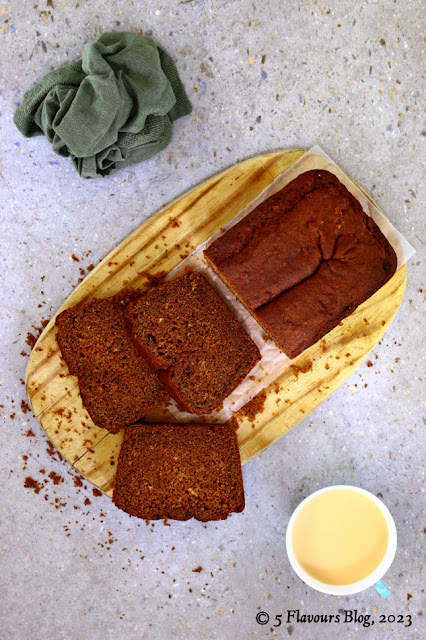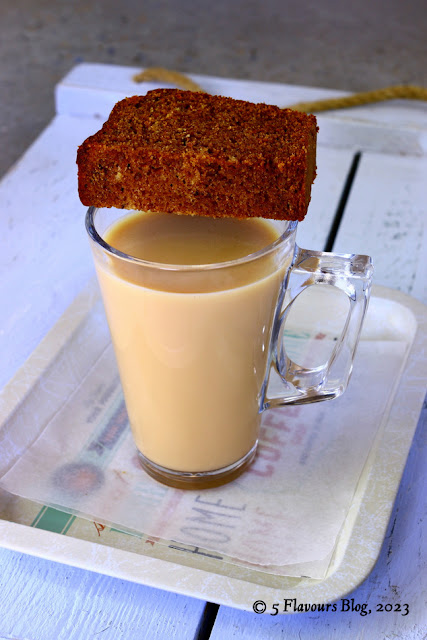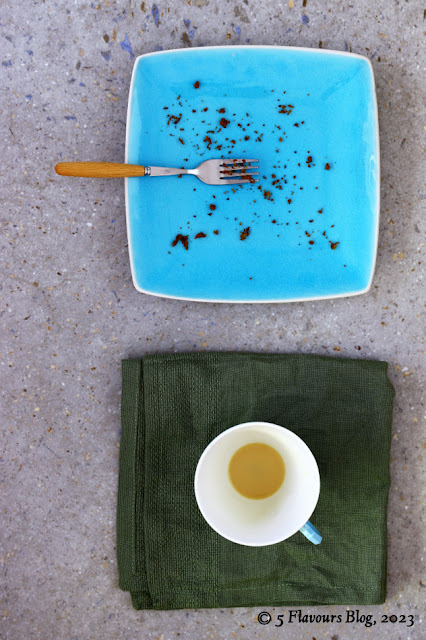Date & Prune Teatime Loaf
A Stoic Reminder of Personal Mortality
– Jump To Recipe –
– Print Recipe –
Until recently, traditional Date Tea Loaf and I had a convoluted and
kind of melancholy history together. Given my frequently winding route to
emotional maturity, our shared history was perhaps inevitable and, possibly,
even preordained. Quite probably this history explains why a younger me firmly associated
dried dates and date tea loaf with old age, the elderly and decades of
emotional guilt. And it had nothing to do with wrinkles or liver spots (or
“coffin spots” as a dermatologist of my acquaintance once irreverently referred
to them).
Traditional date tea loaf – the often too dense and frequently dry kind
– was not something me and my preadolescent siblings were even intermittently exposed
to. Mom certainly never baked them for us at home. Once in a very blue moon she
would bake a loaf when we were about to visit one of my grannies. My suspicion
is that dried dates also made Mom feel uncomfortable on some subconscious
level. However, neither of my grannies had any such emotional qualms as both
baked date loaves frequently at their homes.
Of the three bakers, I distinctly remember one granny baking a much
better quality loaf than the others. Mom and maternal granny did not put
serious effort into their loaves. Both their loaves were the colour of watery
black tea and contained large flakes of partially rehydrated date skin while
being speckled with chunks of only partially macerated dried fruit. Both bakers
invariably baked dry, yet fairly dense tea loaves. Mom because she was always
in a hurry with four young children in tow, and granny because she was an
impatient cook. For granny date tea loaf was also a means to a sweet end:
keeping my stroke impaired grandfather contented and pacified.
On the other hand, paternal Grandmother was an excellent cook and a competent,
all round baker. She usually put effort and dedication into her baked goods. Qualities
that were reflected in her date loaves: rich, quite moist, treacle dark, almost
black, and with a smooth, even crumb structure and texture. Magnificent beasts,
each one of them. None of her always generously thick date loaf slices ever
required a slathering of butter. They were all quite capable of being served as
is – in the nude, so to speak.
Since it was an unusual food item for all of us siblings, it always caused some unease. Particularly so for myself as the first born. Even at that pre-teen age I was keenly aware that I had to set an example for my siblings and be a model child for my parents (according to their ideas of what a model child should be, that is). My Dad in particular made certain he instilled very early on in me the values of responsibility, of being decorous when in adult company, and to accept an adult person automatically as my better and to respect and obey said adult without question. Proper manners and being responsible were very important qualities to Dad.
Now Dad, in his younger days, was a fiercely independent and obstinate
loner. Almost all his married life he made a determined and unrepentant choice
to live as far away from his own family and in-laws as he could. Needless to
say, this life philosophy had a significant effect on us siblings. Neither of
our young parents had any ‘elder’ persons in their small friend circles. Also,
none of their friends had any live-in parents. On top of that, visits to or
from our grandparents were few and far in between. Consequently this severely
limited our childhood exposure to what would today be called “senior persons”
or “the elderly” back then. As such it was rather a mystery of how to behave in
the company of these persons given our lack of opportunities to learn the basic
rules of engagement. Expecting our emotionally relatively uninvolved parents to
explain what they required from us was also a daydream. Dad simply presumed you
to know the Rules and you knew full well there would be hell to pay if you
misbehaved. And Dad firmly adhered to the philosophy that punishment should be
immediate while the transgression was still fresh in the memory of the
perpetrator. Confusingly, ignorance was not a viable excuse either.
Therefore, given these initial social difficulties, it was probably
normal (if unfair) for me to attach a less than glamorous association with
dates and date tea loaves from a young age. Many years later, when paternal Grandmother
went to an old age home, a further association became attached to it: the faint
odour of old age homes. It is an awareness that is hard to pin down. For me it
consists of a miasma of numerous elements: talcum powder; strong disinfectant;
the aroma of large quantities of rather plain food cooking; industrial floor
polish; cherry flavoured cough syrup and sharp camphor rub; whiffs of sweet,
milky tea and that always present, but faint and persistent undertone of urinary
incontinence.
I was already employed at my first formal job when paternal Grandmother
went to live at the old age home where she eventually passed away. It is sad to
admit, but I was an emotionally closed off person at that young adult age. Way
too “bright” academically for my own good as well, but emotionally a dullard.
Yet even I noticed how many of the elderly did not receive regular visitors. Surprisingly
for me, I even noticed how many of these essentially abandoned elderly persons
closed themselves off from the world, retreating into themselves and frequently
pushing out even their peers. Day by day sitting at windows, staring out into nothingness,
or the gardens and the road running past the care home. Waiting (sometimes
impatiently) and probably hoping for release into the great beyond.
Oblivious and inconsiderate, I also insisted in bringing along store
bought date tea loaves to paternal Grandmother when I visited her. These travesties
were baked in bulk by commercial bakers who had neither the inclination nor
time to coax the best out of their ingredients. Each supplier offered a parody
compared to what Grandmother could achieve in her own kitchen when she was
still able to. And to compound matters even further, I never even brought some
of those small catering tubs of butter with.
Since those days many years have passed, idly falling like russet autumn
leaves. A multitude of life lessons – intellectual; personal; emotional and spiritual
– had to be absorbed in that time. Inevitably, the majority were hard lessons
given the obtuse nature of my own DNA. Looking back, and surprising myself, a
modicum of personal growth did occur. Some lessons were simply impossible to
ignore. A personal realisation gradually set in that ignorance is not bliss and
that emotional maturity – exactly like spite – nearly always comes too late.
Maybe it’s no surprise then that I eventually came to associate date tea loaf
with an uneasy sense of guilt and abandonment.
Today, here and now, is me: already finding myself definitely over the
doorstep of middle age. Somewhat surprisingly – and rather unexpected – I too have
also become an ‘older’ person. The grey is silently and remorselessly marching up
my temples and my beard is turning salt & pepper in recklessly uneven
patches. Liver spots appear quietly, almost overnight, on my hands and
elsewhere. I am now mature and confident enough to just ‘be’. It is unnecessary
to wing it any longer; trying to adhere to only half understood and implied
social rules. I make my own rules now. I am what I am and so be it. There are
no more reasons or motivation to conform to an increasingly stupid world and a society
apparently daily growing more ignorant and ridiculous.
Maybe this is part of what being mature is: a collection of deeply
personal and differing awarenesses about the positive and negative aspects of
my own life and the roles I played (and am still playing) in particular in the
lives of those closest to me. This collection of awarenesses seems to grow with
an almost distressing regularity. However, I have made peace with my youthful
emotional stupidity and ignorance. It is an uneasy peace, but it is holding.
Ignorance still is not a good excuse, but I am aware that generally there was
no malice in my actions then. The pain we inflict on others close to us seems
to be part of the cost of personal emotional maturity. Unfortunately I cannot
apologise to Grandmother now. Maybe one day there’ll be an opportunity on some
ethereal plane. I can only hope.
The Date and Prune Teatime Loaf of this recipe is now a personal symbol
of independent maturity and self acceptance. Simultaneously it is also a gentle,
if somewhat bittersweet reminder of my own mortality. Time is indeed finite. It
is an uncomfortable awareness, but there is as yet no need to despair, to “rage
against the dying of the light.” I am now acquainted with hopefully at least
the greater majority of my many failings and shortcomings. In my own way I am
daily making reparations to redress at least some of the damage I caused and
the burden of emotional and spiritual debt I've accumulated over those furious
spring and summer years.
Is it still necessary? Redress? Is it an unwinnable race for redemption
given my age? Is there really a burden of debt to the universe or some sort of
only faintly sensed higher authority? Most of the people I have failed, wronged
or hurt have either passed away or moved on and out of my life. Is redress
necessary? I don’t really know. The answer still eludes me. I do know these
small acts of rectification satisfy my perception that some sort of overall justness
is maintained. On a deeply fundamental level I feel that his is important. I've
gradually become aware that the universe demands that a balance needs to be sustained
between the negative effects I have, and have had in the past, on those around
me and the actions of redress I make to compensate for my burden of debt.
These little redeeming endeavours are legion in their numbers. Small
acts of kindness (not only to my fellow humans), daily gratitude for what we so
easily accept as permanent givens, more patience with others – even unto the often
undeserving ones, looking at people with empathy and insight, keeping my mouth
shut at every available opportunity, dropping scores yet to be settled, and –
possibly the most important – understanding that the dreams, hopes, troubles
and journeys of others are also important and may probably be harder than mine.
I have also realised that I ignore this demand for redress at my peril. The
universe has a sneaky and mostly cynical way of forcing me to make redresses. Usually
on a deeply personal and always uncomfortable level.
Such is my journey to redemption. There are no prizes and there is no
end destination, only the private and intimately personal knowledge that today
I’ll owe the universe maybe a little less than yesterday. There is a sense of
small, but significant accomplishments achieved. A gladdening knowledge of a
somewhat lesser weight carried. An awareness of gradually deepening inner
peace. Thus I strive to redeem myself: one small step at a time. I still have
time, better not to fritter it away.
Despite our somewhat dank history together I still have a serious affinity
for the almost cloyingly sweet, rather exotic and very nearly dark taste and
flavour of the plain old dried & pitted dates used for baking. Dried
Medjool dates (if I can find them in sufficient quantities at an affordable
price) are lovely too and taste better, but they’re bastards to use as the pip obstinately
refuses to separate cleanly from the sticky, shrunken fruit pulp.
However, I’ve always thought that the dried date taste and flavour of
the traditional date tea loaf was a wee bit too much, being so rich and
overbearing as to put me off after one and half or maybe two slices. Both my
grannies used the dried, pitted dates intended for baking. Both also refused to
use the rectangular, shredded and compressed blocks of dried dates frequently
found in the baking section of most large grocery stores. Both grannies claimed
quite rightly the compressed, blocked stuff tasted like cardboard. Steadfast, and
loyal to their memories, I also avoid it.
So, here is a moist, less stodgy and ‘lighter’ version with a somewhat
less intense date flavour. Substituting 25% of the dried dates of the
traditional recipes with dried prunes still provide that full, fruity taste but
with a lesser dominance of dried dates. Also, increasing the ratio of fat to
flour, reducing the quantity of sugar and boosting the baking powder with a
dash of bicarbonate of soda seem to check all the boxes for producing a soft,
moist and fruity teatime loaf.
Granny, who is still with us, enthusiastically approves of this recipe.
I believe paternal Grandmother would’ve approved too; and understood that I had
no malicious intent, only the stupidity of youth.
As a final comment:
For an unusual dried date experience, toast two slices of Date &
Prune Tea Loaf (each about the thickness of your index finger) in a flat
toaster until they are fairly crispy outside, but not charred or burnt. Serve
each slice in a large pasta plate along with a hefty measure of Crème Anglaise
and about a quarter cup of mixed, stewed dried fruit. Make sure the slices are
still quite warm when the cold custard is added – you'll understand why with
the first bite. Suddenly placid and staid old dried dates come alive and
sparkle. Also, try to refrain from adding spearmint or mint sprigs to the final
dessert? Dried dates do nasty, unmentionable things to mint.
DATE & PRUNE TEATIME LOAF
– PRINT RECIPE –
|
Recipe yields: 1 x ±1Kg Loaf |
Soaking time: 8 Hours |
Prep. time: ± 15 Minutes |
Baking time: ± 55 Minutes |
Special Equipment Required:
1
x Electrical hand blender & cup.
1
x Loaf pan, ±1.4L (20cm x 10cm x 7cm)
Ingredients:
|
Cake / All Purpose flour |
220g |
|
Baking powder |
7.5ml |
|
Bicarbonate of soda (Baking
soda ) |
2.5ml |
|
Fine kosher salt |
2.5ml |
|
Fine black pepper |
± ½ ml |
|
|
|
|
Full fat or baking
margarine |
125g |
|
Caster / Granulated sugar |
125g |
|
Extra large eggs, lightly
beaten |
2 |
|
Vanilla essence |
5ml |
|
|
|
|
Dried, pitted dates,
roughly chopped |
125g |
|
Dried prunes, un-pitted |
100g |
|
Bicarbonate of soda (Baking
soda) |
5ml |
|
Boiling water |
200ml |
|
|
|
|
Full cream milk |
±60ml |
Method:
- Combine the chopped dates and pitted prunes in a medium size, heat proof bowl. Sprinkle the bicarbonate of soda evenly over the fruit. Add the boiling water and make sure all the fruit is fully submerged. Cover the bowl and set aside eight hours (or overnight) for the fruit to soften.
- Separate the soaked prunes from the dates and use a small, sharp utility knife to remove and discard the prune pips.
- Transfer the softened fruit along with its soaking liquid to a small liquidizer or the cup of an electrical hand blender. Add the milk and process or blend until a fine puree is formed and no peel fragments from the dates are still visible. Set aside until needed.
- Combine the flour, baking powder, bicarbonate of soda, salt and black pepper in a medium bowl. Sift together three times to ensure all the ingredients are completely combined.
- Cream the margarine and sugar together in a large mixing bowl. Add small quantities of egg if the margarine and egg clumps in the beater attachments instead of creaming. Continue adding egg whilst beating the egg and margarine. Add the vanilla essence when all the egg is added. Beat everything together for at least 4 – 5 minutes. The mixture may look like it has split or curdled. This is normal.
- Add the flour mixture and fruit puree in two alternating batches to the creamed egg, margarine and sugar mixture. Combine the components with a silicone spatula using figure 8 motions to incorporate everything between additions into the forming batter. Be careful not to over mix. The batter should be very soft, but not runny. Add additional milk if the batter seems to be too dry.
- Transfer the batter to a well greased and flour dusted loaf pan and smooth the top of the batter with an offset spatula. Use the back of a teaspoon to create a shallow trench in the middle of the batter along the length of the pan. This will limit the extent to which the rising loaf cracks open on top as it bakes in the oven.
- Bake 55 minutes on the middle shelf of a pre-heated 165°C convection oven (65 – 70 minutes at 180°C in a normal, static oven) or until a bamboo skewer stuck into the top of the baked loaf comes out clean. Note that the loaf cake will not readily pull away from the pan sides when done as the cake is quite heavy and relatively dense.
- Remove the cake from the oven when done and allow to cool for 20 – 25 minutes on a wire cooling rack before attempting to remove it from the pan.
- Store the loaf cake in a sealed container at room temperature. Refrigerate any leftover cake after three days.
© RS Young, 2023
– RECIPE INDEX PAGE –
Follow Me on Facebook
Note:
Post updated on 2025.01.21 to include:
1. Recipe Index, "Like" buttons and Facebook & Pinterest follow links.
|
Blog
Post Writing Trivia for the Curious: |
|
|
1. Concept inception date : |
± August 2021 |
|
2. Initial pen to paper date : |
06.09.2021 |
|
3. Number of document re-writes : |
6 |
|
4. Date of final edit : |
27.01.2023 |
|
5. Date of first post related photography : |
25.01.2023 |
|
6. Date of last photography : |
27.01.2023 |
|
7. Number of words : |
2 899 |
Image Credits:
All non-watermarked images were found on Pinterest










Comments
Post a Comment